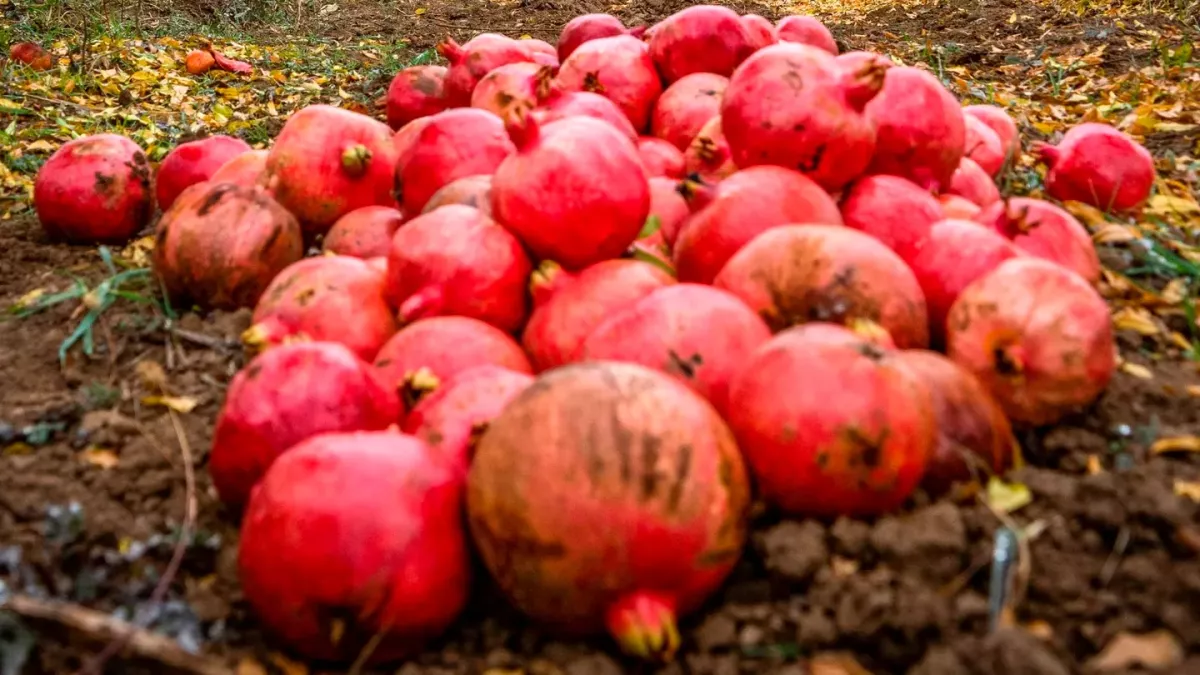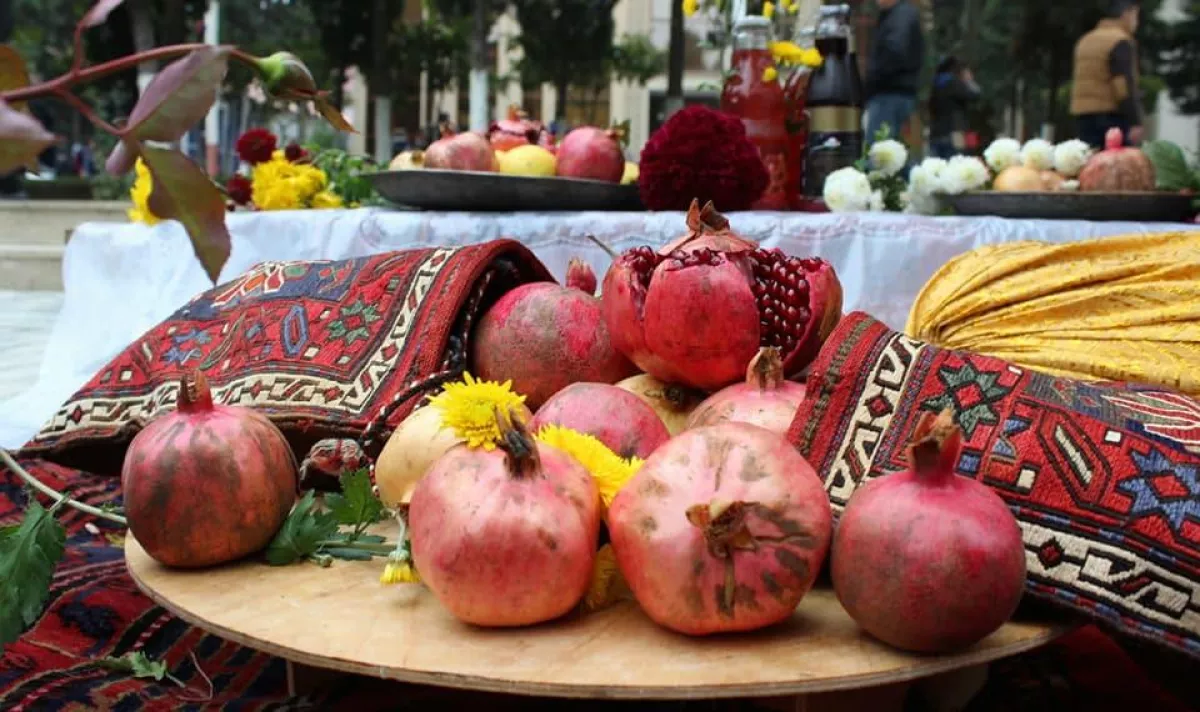How Azerbaijan is shaping future of global pomegranate craze Article by Forbes
The American magazine Forbes has published an article by Daphne Ewing-Chow on the resurgence of pomegranate’s popularity worldwide, particularly in Azerbaijan. Caliber.Az reprints this material.
"Once revered as a mystical symbol in ancient mythology, the pomegranate is now experiencing a major revival as a darling of the health food industry, the star of TikTok snack trends, and the heart of functional food innovation.
As global demand swells— projected to nearly double to $10.6 billion by 2033— nations with industrial export capacity are scrambling to scale up. Among them, Azerbaijan stands out— not as the largest or the most obvious producer, but as the most intriguing, the most diverse— and quite possibly the most delicious.
The Azerbaijani pomegranate, or nar, first caught my attention while visiting the South Caucasian nation in November 2024. During my visit, I was taken to Karabakh, a region still bearing the scars of a decades-long conflict that officially ended in 2020. Amid the remnants of war— burnt-out fields, crumbling structures, and silent stretches of earth— something extraordinary stood out: pomegranate trees.
Laden with vibrant, ruby-red fruit, they rose defiantly from the barren soil— resilient, almost defiant. In a region still rebuilding from war, they offered a quiet metaphor for regeneration and enduring life. For Azerbaijan, where the pomegranate is the country’s national symbol, their presence was a reflection of identity, perseverance, and the timeless link between land and culture.
The global pomegranate trend
The humble pomegranate has been having a global moment. Featured in celebrity-endorsed recipes and highlighted in the BBC’s “Food Trends to Watch in 2025,” the nutrient-rich fruit has captured attention not only for its health benefits, but also for its versatility and aesthetic appeal— and fitting neatly into the current fascination with “pearl-shaped foods that pop in your mouth.”

Recipes with pomegranate seeds (arils) are garnering millions of likes on social media, and are being featured in innovative recipes across the web, from pomegranate bark, to pomegranate popcorn, pomegranate smoothies and pomegranate fruit leather (also known as lavashak). Yet beyond its pop-culture rise to foodie stardom, the fruit’s deeper resonance lies in a growing appetite for foods that connect consumers with heritage, tradition and storytelling. It is here that the global pomegranate boom finds a natural home in Azerbaijan, where the fruit is not just fashionable, but foundational.
Azerbaijan’s king of fruits
In Azerbaijan, the pomegranate is cultivated across 25,000 hectares of orchards, celebrated in local legends and annual festivals, etched into frescoes, and lovingly folded into everything from savory stews to syrupy preserves. Though modest in export volume compared to giants like India or Iran, Azerbaijan produces what many argue are the finest pomegranates in the world.
Azerbaijan’s advantage is rooted in terroir. The Goychay region, with its unique microclimate and mineral-rich soil, has become globally synonymous with Azerbaijani premium pomegranates. More than 60 indigenous varieties, and more than 200 varieties in total, are grown across the country’s nine climatic zones, nurtured by centuries of traditional knowledge and a deep cultural reverence for the fruit.
Feride Buyuran, author of the cookbook “Pomegranates and Saffron: A Culinary Journey to Azerbaijan,” and creator of AZCookbook.com describes Goychay as Azerbaijan’s pomegranate capital. “There dozens of pomegranate varieties grow in each and every front and back yard and vast orchards across the region,” she explains. “Juicy pomegranates with flavors that run from tart and tangy to sweet, with seeds that are burgundy, red and even white, with skins that can be red, pink, or white. Goychay is a blissful paradise for pomegranate enthusiasts.”

Unlike mass-market producers that prioritize yield and shipping resilience, Azerbaijani farmers often harvest by hand, favoring ripeness and flavor over scalability. The result is a pomegranate that bursts with deep, complex taste— used not only fresh, but also pressed into narsharab (a tangy molasses-like syrup), cooked into dishes like Nar Govurmasi (braised lamb with pomegranates and chestnuts), brewed into magenta wines, processed into sorbets, preserved as nardancha jam and integrated in stews, salads and dumplings.
Symbolically, the pomegranate in Azerbaijan carries heavy cultural weight. It is seen as a talisman of abundance, fertility, and eternity. Its image appears in poetry, souvenirs, carpets, and on palace walls.
Each autumn since 2006, the Goychay Pomegranate Festival (Nar Bayrami) has transformed Goychay into a vibrant celebration of national pride and cultural heritage. Recognized in 2020 by UNESCO and inscribed on the Representative List of the Intangible Cultural Heritage of Humanity, the festival draws thousands of locals and international visitors alike to honor the revered “king of fruits.”

The event bursts with color, flavor, and tradition— featuring lively folk music, spirited dance performances, and a dazzling array of culinary showcases that highlight the pomegranate’s starring role in Azerbaijani cuisine, from ruby-red juices to fragrant sauces and age-old family recipes.
That heritage is beginning to yield dividends, as the "Made in Azerbaijan" label gains increasing recognition on the global stage. In January 2025, Azerbaijan exported 2,278 tons of pomegranates worth $2.02 million— a 35% jump in value over the previous year. Though only a fraction of its total production of 190,000 tons, these exports reflect growing global interest in artisanal, traceable, and culturally rich food products.
Azerbaijan’s boutique appeal may be its biggest strength. As consumers shift toward functional foods with a story, the pomegranate checks every box: antioxidant-rich, low in calories, gut-friendly— and increasingly, a visual star on social media. TikTok videos of chocolate-dipped pomegranate snacks have drawn millions of views; Instagram is peppered with images of pomegranate-laced lavashak and glittering salads.
With climate change threatening consistency in larger-producing regions, Azerbaijan’s high-altitude, arid zones provide relative insulation, making it a promising haven for quality pomegranate cultivation. The country is rightfully eyeing expanded exports not just of fresh fruit, but of value-added products like extracts, juices, and natural cosmetics.
The market may be growing rapidly, but it’s also evolving— away from commodities and toward craftsmanship. For Azerbaijan, the pomegranate represents a convergence of agriculture, food culture, and national identity. Its quiet strength lies in what the modern consumer increasingly values: depth, distinctiveness, and authenticity. In the competitive race for the world’s next great superfruit, it turns out the smallest contender might just offer the most flavor," article reads.
By Aghakazim Guliyev








